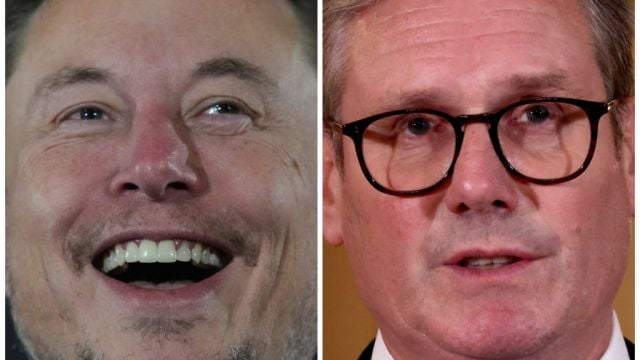Keir Starmer’s spat with Elon Musk has escalated, with the social media boss calling the British prime minister “two-tier Keir” in a series of new tweets.
Mr Musk reposted a series of images, videos and memes related to ongoing rioting in the UK.
The owner of X, formerly Twitter, tagged Mr Starmer in several tweets, writing “Why aren’t all communities protected in Britain?” and “#TwoTierKeir”.
This is not protest, it is pure violence.
We will have a standing army of public duty officers.
We will ramp up criminal justice.
We will apply criminal law online as well as offline.
We will not tolerate attacks on mosques or on Muslim communities. pic.twitter.com/C1SmjJjo4R— Keir Starmer (@Keir_Starmer) August 5, 2024
Advertisement
Mr Starmer has rejected claims of “two-tier policing” in Britain after Nigel Farage suggested riots over the last week have been dealt with more harshly than other recent unrest and protests.
Downing Street had criticised Mr Musk for tweeting that “civil war is inevitable” in the UK, with Mr Starmer’s official spokesman saying that there was “no justification for comments like that”.
“We’re talking about a minority of thugs who don’t speak for Britain,” he said.
England's justice minister Heidi Alexander told Times Radio it was “deeply irresponsible” and that “everyone should be appealing for calm”.
“Use of language such as a ‘civil war’ is in no way acceptable. We are seeing police officers being seriously injured, buildings set alight, and so I really do think that everyone who has a platform should be exercising their power responsibly,” Ms Alexander said.
Mr Musk’s latest retweets included an image what appears to be men in military uniforms and helmets with union jacks superimposed onto their backs approaching a front door, with the caption: “We saw your meme, step outside!”
Michelle Donelan, a former Conservative MP who worked on the UK's Online Safety Act when she was technology secretary, had earlier criticised Mr Starmer for “going off on one at Elon Musk”, saying the British prime minister should focus on engaging with social media platforms.
She told GB News: “I don’t think he’ll do anything in relation to social media. We’ve done the Online Safety Act, which is the most comprehensive Bill in this space in the world.”
Offences around incitement in UK law were in place long before the social media age, and fall under the Public Order Act 1986, but stronger measures are on the way in the form of the Online Safety Act, which passed into law in 2023 but is yet to come into full effect.
It will require social media firms to take more robust action against illegal and harmful content and activity on their platforms.
But Mr Starmer’s spokesman said on Monday that social media firms have a responsibility to make sure their users are safe and that criminal activity is not being posted on their platforms.
He said: “They shouldn’t be waiting for the Online Safety Act for that.”
A mosque in Southport and a Citizens Advice office and police station in Sunderland are among buildings in England that have been damaged during days of clashes between anti-immigration demonstrators, police and counter-protesters.
Put simply: If you engage in violent protests, you will face the full force of the law. pic.twitter.com/4zDDqgX1sv
— Home Office (@ukhomeoffice) August 5, 2024
Ms Alexander also said the British government was taking a “very robust approach” to social media companies and that being behind a computer or mobile phone screen would offer no protection from the law.
She told Sky News: “There has been some welcome action where there has been automated removal of some false information, but I do think the social media companies could and should be doing more.
“They have got a moral responsibility not to be propagating and disseminating misleading and inflammatory content on their platforms.”
On Monday, British technology minister Peter Kyle said he had met representatives from TikTok, Facebook’s parent company Meta, Google, and X “to make clear their responsibility to continue to work with us to stop the spread of hateful misinformation and incitement”.
British home secretary Yvette Cooper said the UK government would not tolerate “armchair thuggery” and that social media platforms needed to take responsibility for the spread of online misinformation which has fuelled much of the disorder.







